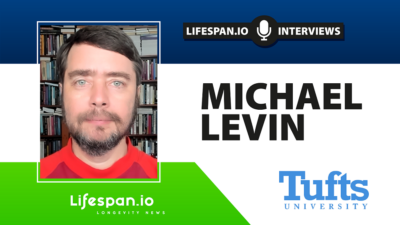
Category: Interviews

Longevity Advocacy in 2025: The Expert Roundup
The last installment in our end-of-year series of expert roundups might be the least flashy, but it is arguably no less important than the previous ones dedicated to longevity biotech

Geroscience in 2025: The Expert Roundup
2025 was a good year for geroscience, marked by rapid strides and critical milestones. Yet, the path wasn’t always smooth: progress in some areas lagged, research hit dead ends, and

Longevity Biotech in 2025: The Expert Roundup
How did the year 2025 turn out for longevity biotech? Was it surprising or more of the same? Exciting or disappointing? Was the progress fast-moving or excruciatingly slow? What should

Maximina Yun on the Wonders of the Axolotl
Dr. Maximina Yun, principal investigator at Chinese Institutes for Medical Research in Beijing (CIMR), studies some of the most amazing animals in the world: salamanders, a group of amphibians that

Andrea Maier on Longevity Medicine for All
Dr. Andrea Maier, Oon Chiew Seng Professor in Medicine at the National University of Singapore, is a veteran geroscientist and one of the most familiar faces in the rising field

Sam Sharifi on Fixing Our DNA
Among the hallmarks of aging, DNA damage is both one of the most important and one of the hardest to crack. A couple of years ago, when I first learned

Joe Betts-Lacroix on Retro Bio and Its Recent AI Advancement
Retro Biosciences, one of the hottest startups in the longevity field, was founded about five years ago by the tech entrepreneur Joe Betts-Lacroix with a $180 million investment from his

Nir Barzilai: “Positive Evidence for Metformin is Mounting”
Dr. Nir Barzilai, the director of the Institute for Aging Research at the Albert Einstein College of Medicine, among his many other titles, is one of geroscience’s most prominent figures.

Gabriel Cian on Investment and the 2060 Longevity Forum
In this Lifespan interview, we speak with Gabriel Cian, founder of the 2060 Longevity Forum, about how his background in software shaped his views on healthspan innovation, the forum’s approach

Dr. David Furman on Inflammation and Aging
The longevity field hasn’t been very good at naming things, but one notable exception is “inflammaging”: the low-grade chronic inflammation that correlates with aging. Recognition has been growing that inflammation,

Boyang Wang on Targeting Underfunded Longevity Projects
In this interview, Boyang Wang of Immortal Dragons discusses the kinds of projects he wants to fund, ways in which the industry can be encouraged to develop, relationships between the

Rejuve.AI: Just Another App or a Longevity Research Network?
On its website, Rejuve.AI, a company co-founded by its dynamic CEO, Jasmine Smith, and a renowned AI researcher, Ben Goertzel, promises a lot of things: to “democratize longevity, globally,” to

Michael Levin on Bioelectricity in Development and Aging
Michael Levin, professor at Tufts University and director of Allen Discovery Center, has been working for years on how bioelectrical patterns affect development and aging. His research proves that this

Joshua “Scotch” McClure: “Infectious Disease Drives Aging”
Like many people, I’m both wary of and intrigued by people who make bombastic claims. Years in the longevity field have taught me caution but also that big claims are

Junevity Is Silencing RNA to Treat Obesity and Diabetes
Some longevity biotech companies fit neatly into one of the big buckets we have in this field, like senolytics or cellular reprogramming. Others, such as Junevity, a small spin-out from

Longevity Advocacy in 2025: The Expert Roundup
The last installment in our end-of-year series of expert roundups might be the least flashy, but it is arguably no less important than the previous ones dedicated to longevity biotech and geroscience. Public advocacy is a powerful lever. To quote Abraham Lincoln: “Public sentiment is everything.

Geroscience in 2025: The Expert Roundup
2025 was a good year for geroscience, marked by rapid strides and critical milestones. Yet, the path wasn’t always smooth: progress in some areas lagged, research hit dead ends, and familiar bottlenecks persisted. Against this backdrop, we asked five prominent geroscientists to share their perspectives on

Longevity Biotech in 2025: The Expert Roundup
How did the year 2025 turn out for longevity biotech? Was it surprising or more of the same? Exciting or disappointing? Was the progress fast-moving or excruciatingly slow? What should we expect in 2026? We asked five leading experts to weigh in. Where did longevity biotech

Maximina Yun on the Wonders of the Axolotl
Dr. Maximina Yun, principal investigator at Chinese Institutes for Medical Research in Beijing (CIMR), studies some of the most amazing animals in the world: salamanders, a group of amphibians that includes newts and species such as the universally loved axolotl. On top of being cute, salamanders

Andrea Maier on Longevity Medicine for All
Dr. Andrea Maier, Oon Chiew Seng Professor in Medicine at the National University of Singapore, is a veteran geroscientist and one of the most familiar faces in the rising field of longevity medicine, which aims to translate the early successes of geroscience into clinical practice. Parallel

Sam Sharifi on Fixing Our DNA
Among the hallmarks of aging, DNA damage is both one of the most important and one of the hardest to crack. A couple of years ago, when I first learned about Matter Bioworks at a prominent longevity conference, I was amazed at the audacity of the

Joe Betts-Lacroix on Retro Bio and Its Recent AI Advancement
Retro Biosciences, one of the hottest startups in the longevity field, was founded about five years ago by the tech entrepreneur Joe Betts-Lacroix with a $180 million investment from his friend Sam Altman, the CEO of OpenAI. Despite its hefty war chest, the company initially pursued

Nir Barzilai: “Positive Evidence for Metformin is Mounting”
Dr. Nir Barzilai, the director of the Institute for Aging Research at the Albert Einstein College of Medicine, among his many other titles, is one of geroscience’s most prominent figures. He is everywhere all at once, seemingly collaborating with the entire world, but is best known

Gabriel Cian on Investment and the 2060 Longevity Forum
In this Lifespan interview, we speak with Gabriel Cian, founder of the 2060 Longevity Forum, about how his background in software shaped his views on healthspan innovation, the forum’s approach to scientific and investment credibility, and what he sees as the biggest bottlenecks and opportunities facing

Dr. David Furman on Inflammation and Aging
The longevity field hasn’t been very good at naming things, but one notable exception is “inflammaging”: the low-grade chronic inflammation that correlates with aging. Recognition has been growing that inflammation, the ubiquitous reaction of the immune system to various stressors, is a major driver of many

Boyang Wang on Targeting Underfunded Longevity Projects
In this interview, Boyang Wang of Immortal Dragons discusses the kinds of projects he wants to fund, ways in which the industry can be encouraged to develop, relationships between the East and West in longevity research and development, and what got him involved in longevity. Hello,

Rejuve.AI: Just Another App or a Longevity Research Network?
On its website, Rejuve.AI, a company co-founded by its dynamic CEO, Jasmine Smith, and a renowned AI researcher, Ben Goertzel, promises a lot of things: to “democratize longevity, globally,” to enable you to “take control of your data, and harness its earning potential,” and to “unite

Michael Levin on Bioelectricity in Development and Aging
Michael Levin, professor at Tufts University and director of Allen Discovery Center, has been working for years on how bioelectrical patterns affect development and aging. His research proves that this often-overlooked part of biology is immensely important and that mastering its mechanisms might one day do

Joshua “Scotch” McClure: “Infectious Disease Drives Aging”
Like many people, I’m both wary of and intrigued by people who make bombastic claims. Years in the longevity field have taught me caution but also that big claims are not necessarily outlandish, and few people make bigger claims than Joshua “Scotch” McClure, founder and CEO

Junevity Is Silencing RNA to Treat Obesity and Diabetes
Some longevity biotech companies fit neatly into one of the big buckets we have in this field, like senolytics or cellular reprogramming. Others, such as Junevity, a small spin-out from the University of California, San Francisco, dare to walk an unbeaten path. Junevity pursues the ambitious





